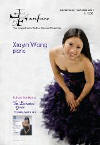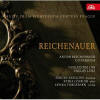Texte paru dans: / Appeared in:

Fanfare Magazine 35:1 (09/10 - 2011)
Pour
s'abonner / Subscription information
Les abonnés à Fanfare Magazine ont accès aux archives du
magazine sur internet.
Subscribers to Fanfare Magazine have access to the archives of the magazine
on the net.
Supraphon
SU4035

Code-barres / Barcode:
0099925403522
Consultez toutes les évaluations recensées pour ce cd
~~~~ Reach all the evaluations located for this CD
I doubt that I will offend anyone if I characterize Antonín Reichenauer as “obscure.” Reichenauer was an organist and choir master in Prague’s Lesser Town during the first third of the 18th century. According to Supraphon’s program note the date and place of his birth are unknown, although it also says that he died in 1730 at the age of 34. In addition to his ecclesiastical duties Reichenauer served as court composer for the Bohemian Count Wenzel Morzin, for whom he undoubtedly wrote the instrumental works here recorded. The count, a distant cousin of the Esterházys, maintained a substantial musical establishment, and he was evidently an astute judge of musical talent. Reichenauer’s predecessor at the court was Johann Friedrich Fasch; Vivaldi dedicated his op. 8 concertos (which include The Four Seasons) to the count; and it was for Morzin that Josef Haydn wrote his first symphonies. It’s fairly safe to say as well that Reichenauer is not going to be regarded as a neglected genius, but that he was a competent, professional composer, who learned well from his exposure to Vivaldi’s concertos. Bassoonists, especially, are likely to welcome these additions to their slender repertoire (though perhaps not quite as slender as it may seem, since Reichenauer’s exemplar wrote more concertos for bassoon than for any solo instrument other than the violin). The overture (orchestral suite) bespeaks Reichenauer’s familiarity with the French style. I think I can say that an hour spent with Reichenauer is not an hour wasted. The period-instrument performances are very good, though it must be said that Xenia Löffler’s oboe is a little sour by today’s standards. No such reservations apply to bassoonist Sergio Azzolini or violinist Lenka Torgerson. We all know, intellectually, that neither Bach nor Vivaldi worked in a vacuum. This recording helps in its small way to expand our knowledge of their context. Recommended for the curious.
Cliquez l'un ou l'autre
bouton pour découvrir bien d'autres critiques de CD
Click either button for many other reviews


